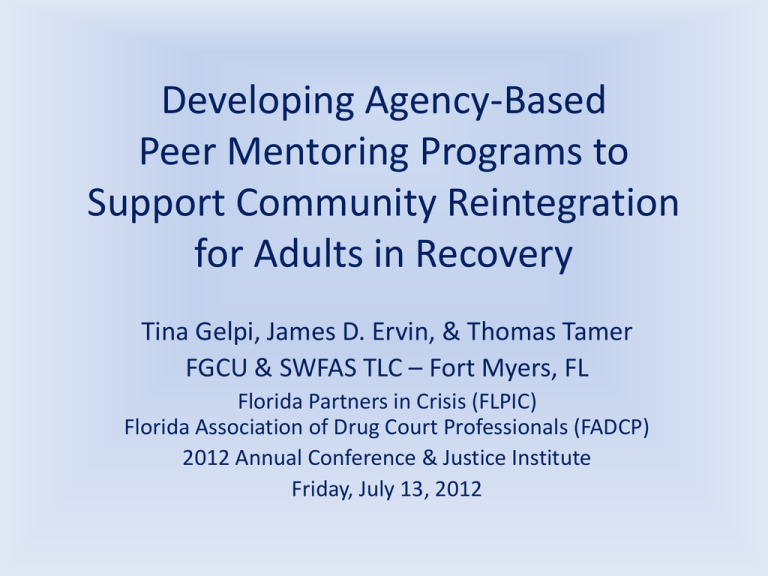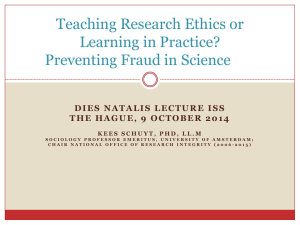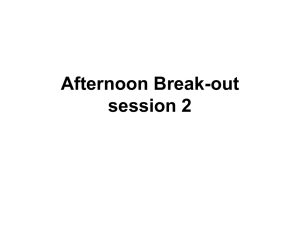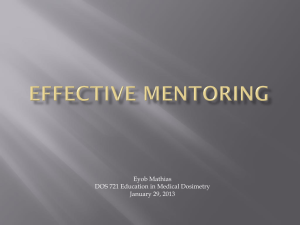Developing Agency-Based Peer Mentoring Programs to Support
advertisement

Developing Agency-Based Peer Mentoring Programs to Support Community Reintegration for Adults in Recovery Tina Gelpi, James D. Ervin, & Thomas Tamer FGCU & SWFAS TLC – Fort Myers, FL Florida Partners in Crisis (FLPIC) Florida Association of Drug Court Professionals (FADCP) 2012 Annual Conference & Justice Institute Friday, July 13, 2012 Objectives 1. 2. 3. Identify key principles of community-campus partnerships for developing an innovative program to address community reintegration needs of persons in recovery. Describe the process of developing and implementing two agency-based peer mentoring programs for adults in recovery and their initial outcomes. Compare and contrast the roles of sponsors to support recovery and mentors to support community reintegration. Our Story to Tell • Through community-campus partnerships, two agency-based peer mentoring programs to support community reintegration of adults in recovery from substance addictions are being established. • The process of developing these programs, one for women and one for men, and the initial outcomes of the program development process will be shared. Principles of Community-Campus Partnerships • Agree upon mission, values, goals, and measurable outcomes • Display mutual trust, respect, genuineness, and commitment • Build upon identified strengths and assets and address areas that need improvement • Balance power and share resources among partners • Communicate openly, including listening, developing a common language, and validating/clarifying the meaning of terms Principles of Community-Campus Partnerships • Establish roles, norms, and processes for the partnership with the input and agreement of all partners • Provide feedback to, among, and from all partners to continuously improve the partnership and its outcomes • Share credit for the partnership's accomplishments • Take time to develop and evolve the partnership over time (http://www.ccph.info, 2008) Second Chance Act Adult Mentoring Grant RFP • Began with guidance from Second Chance Act Grant RFP – “…designed to help communities…address the challenges posed by offender reentry and recidivism reduction.” • “Reentry” from jail – initial focus – “…not a specific program, but rather a research-driven process that starts when an offender is initially incarcerated and ends when the offender has been successfully reintegrated in his or her community as a lawabiding citizen.” Second Chance Act Adult Mentoring Grants to Nonprofit Organizations Competitive Grant Announcement (2011) Second Chance Act Adult Mentoring Grant RFP • Reentry process – Includes programs to “ensure a safe and successful transition from prison or jail to the community” – “Mentoring of offenders can be a significant element of a successful reentry strategy.” Second Chance Act Adult Mentoring Grants to Nonprofit Organizations Competitive Grant Announcement (2011) Second Chance Act Mentoring Grant • SWFL Community Foundation funding – Received by Florida Gulf Coast University (FGCU) & community partners • In response to input from participating community partners – Shifted to developing a community reintegration support program for adults participating in addiction recovery services rather than exiting from prison or jail Second Chance Act Mentoring Grant • Sponsor role – Supporting recovery • Mentor role – Supporting community reintegration while maintaining recovery – Community reintegration – surviving and thriving as a contributing member of a community • Group vs. pair vs. individual support • Anticipated benefits/outcomes for participants Needs Assessment @ After the Rain (ATR) • Responded to Executive Director’s interest in developing a program for women “to give back” • Focus group discussions facilitated by FGCU Occupational Therapy graduate students & faculty – To identify peer support needs of graduates and current residents of ATR transitional living program – Initially reviewed Courage to Change Interactive Journaling® System through focus group discussions – Interest was indicated in a program that was gender specific and not corrections-oriented Needs Assessment @ After the Rain (ATR) Themes from program planning discussions with women preparing to be peer mentors – 1) Roles – Transition from the role of substance abuser to the role of peer mentee, then peer mentor – – From “I played volleyball in college; it was the love of my life and it become non-existent. Just drugs and alcohol took over my life.” To “We aren’t those people anymore. We have become something totally different.” Needs Assessment @ After the Rain (ATR) 2) Routines – Transition from the damaging routines of substance addiction to creating healthy, productive alternatives daily – From “I knew how to drink and drug and that took up my whole day and that was about it.” – To “Start new interests and do what you can to pursue them.” Needs Assessment @ After the Rain (ATR) 3) Emotions – Transition from suppressing to expressing feelings and emotions – From “I was so detached from my feelings that I truly had myself convinced that there weren’t any.” – To “…it’s the ladies that live here, because she came before me and she might have an emotion I don’t have, this one taught me another emotion, each one of them has brought things back.” Needs Assessment @ After the Rain (ATR) 4) Values – Transition from compromising to embracing core values – From “I compromised everything, all of my values. Getting high and staying high was better than everything.” – To “I expect them to give what I gave to them, because that’s the only way we can all be here…to be able to give back that smile, that love, that hug.” Peer Mentoring Program @ After the Rain (ATR) • Establishing, supporting, and celebrating achievement of community reintegration goals • Learning about areas of occupation (activities of daily living – basic and instrumental, education, work, play, leisure, rest/sleep, and social participation – peers, family, and community) • Considering supporting vs. non-supporting roles, habits, routines, rituals, values, and personal & community resources • Receiving/offering peer support from mentors and other mentees Peer Mentoring Program @ After the Rain (ATR) • Outcomes to be determined – Mentor/Mentee demographics – Personal occupation-based goal setting and achievement – Quality of Life – WHOQOL-BREF • “…how you feel about your quality of life, health, or other areas of your life” (World Health Organization, 1998) • Domains – 1) Physical, 2) Psychological, 3) Social relationships, 4) Environment – Exit interview (qualitative) Peer Mentoring Program @ Southwest FL Addiction Services Transitional Living Center (SWFAS TLC) • Responded to Managing Director’s request to develop a peer mentoring program for men in recovery • Program advisors – James D. Ervin – Resident of SWFAS halfway house; completing Certified Recovery Peer Specialist training – Thomas Tamer – Resident of SWFAS permanent supportive housing • Collaborating with FGCU Occupational Therapy and Community Health faculty and graduate/undergraduate students Peer Mentoring Program @ Southwest FL Addiction Services Transitional Living Center (SWFAS TLC) James D. Ervin • Community reintegration – My reentry – The needs I faced and lacked – What reintegration means to me • Developing a peer mentoring program – Sponsor – Mentor – The difference (Sponsor vs. Mentor) Peer Mentoring Program @ Southwest FL Addiction Services Transitional Living Center (SWFAS TLC) • Purpose – Identifying barriers – Being in touch with community resources • Creating a Peer Mentoring Program for Men – Building on something familiar (football) – Developing a theme – Encouraging change • Ultimate goal – Outcomes for participants, agency, and community Looking Ahead • Peer Mentoring Program – Further develop and modify based on participant input & feedback; seek program support in the community – To support community reintegration of a person in recovery • Further define the role of a peer mentor vs. the role of a sponsor as complementary supports for a person in recovery living in the community • Respond to gender-specific interests and needs Contact Information Southwest Florida Addiction Services (SWFAS) • James D. Ervin • Thomas Tamer Florida Gulf Coast University (FGCU) • Tina Gelpi, OTD, OTR/L – Department of Occupational Therapy & Community Health – tgelpi@fgcu.edu






